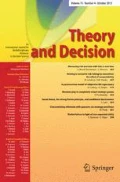Abstract
We characterize two lexicographic-type preference extension rules from a set X to the set Ψ of all orders on this set. Elements of X are interpreted as basic economic policy decisions, whereas elements of Ψ are conceived as political programs among which a collectivity has to choose through majority voting. The main axiom is called tournament-consistency, and states that whenever majority pairwise comparisons based on initial preferences on X define an order on X, then this order is also chosen by a majority among all other orders in Ψ. Tournament-consistency thus allows to predict the outcome of majority voting upon orders from the knowledge of majority preferences on their components.
Similar content being viewed by others
REFERENCES
Anderson, S.P., Kats, A. and Thisse, J.F. (1994), Probabilistic voting and platform selection in multi-party elections, Social Choice and Welfare 11: 305–322.
Barbera, S., Barrett, C.R. and Pattanaik, P.K. (1984), On some axioms for ranking sets of alternatives, Journal of Economic Theory 32: 301–308.
Bossert, W. (1989), On the extension of preferences over a set to the power set: an axiomatic characterization of a quasi-ordering, Journal of Economic Theory 49: 84–92.
Bossert, W. (1995), Preference extension rules for ranking sets of alternativeswith a fixed cardinality, Theory and Decision 39: 301–317.
Bossert, W., Pattanaik, P.K. and Xu, Y. (1994), Ranking opportunity sets: an axiomatic approach, Journal of Economic Theory 63: 326–345.
Calvert, R.L. (1986), Models of imperfect information in politics, Chur Harwood Academic Publishers.
Coughlin, P. (1990), Majority rule and election models, Journal of Economic Survey 4: 157–188.
Cox, G.W. (1990), Multicandidate spatial competition, in: J. Enelow and M. Hinich (eds.), Advances in the spatial theory of voting, Cambridge: Cambridge University Press. (pp. 179–198).
Eaton, B.C. and Lipsey, R.G. (1975), The principle of minimum differentiation reconsidered: some new developments in the theory of spatial competition, Review of Economic Studies 42: 27–49.
Heiner, R.A. (1981), The collective decision problem and a theory of preferences, Economic Inquiry 19: 297–332.
Heiner, R.A. and Packard, D.J. (1984), A uniqueness result for extending orders; with applications to collective choice as inconsistency resolution, Journal of Economic Theory 32: 180–184.
Kannai, Y. and Peleg B. (1984), A note on the extension of an order on a set to the power set, Journal of Economic Theory 32: 172–175.
Laffond, G., Lainé, J. and Laslier J.F. (1996): Composition-consistent tournament solutions and social choice functions, Social Choice and Welfare 13: 75–93.
Laffond, G., Laslier, J.F. and Lebreton M. (1993), The bipartisan set of a tournament game, Games and Economic Behavior 5: 182–201.
Laffond, G., Laslier, J.F. and Lebreton, M. (1995), Condorcet choice correspondences: a set-theoretical comparison, Mathematical Social Sciences 30: 23–35.
McGarvey, D.C. (1953), A theorem on the construction of voting paradoxes, Econometrica 21: 608–610.
Moulin, H. (1986), Choosing from a tournament, Social Choice and Welfare 2: 271–291.
Roemer, J.H. (1994), A theory of policy differentiation in single issue electoral politics, Social Choice and Welfare 11: 355–380.
Stearns, R. (1959), The voting problem, American Mathematical Monthly 66: 761–763.
Sunding, D. (1995), Social choice by majority rule with rational participation, Social Choice and Welfare 12: 3–12.
Author information
Authors and Affiliations
Corresponding author
Rights and permissions
About this article
Cite this article
Laffond, G., Lainé, J. Majority voting on orders. Theory and Decision 49, 249–287 (2000). https://doi.org/10.1023/A:1026425015999
Issue Date:
DOI: https://doi.org/10.1023/A:1026425015999



